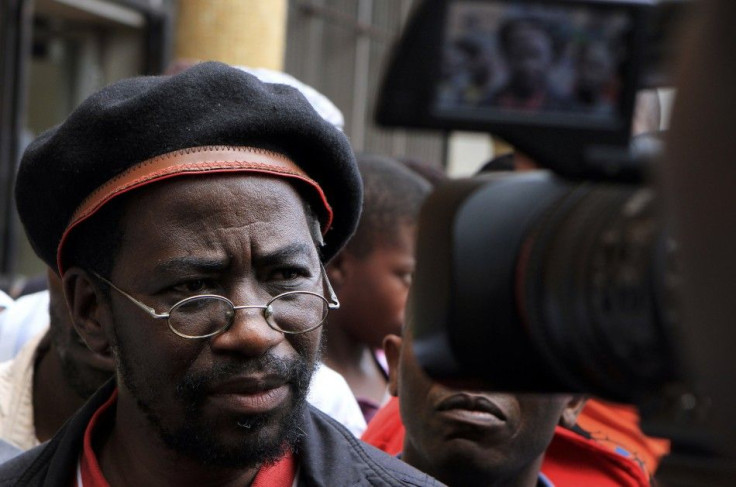No Jail Sentence For Zimbabwe Activists: Lessons From Arab Spring?

On Wednesday, a Zimbabwe court judge announced that six activists who had been arrested for watching videos of the Arab Spring would not be sent to jail.
The prosecutor in this case had originally pursued a 10-year sentence; now the punishment has been downgraded to 420 hours of community service and a $500 fine, according to the New York Times.
Munyaradzi Gwisai, a former representative in Parliament as part of the Movement for Democratic Change (MDC), which opposes the rule of Zimbabwe President Robert Mugabe, now teaches law at a university in the capitol city of Harare. He was arrested, along with five others, for watching news coverage of uprisings in the Middle East as part of a seminar on political activism.
The case attracted national attention; even in Zimbabwe, with its long history of political repression, the potential severity of this punishment seemed an extreme response to such a minor offense. But Judge Kudakwashe Jarabini announced the lighter sentence and said in his courtroom that he had decided to take a compassionate approach.
The move could signify growing unease on the part of ruling politicians, who have reason to be wary of sparking an uprising similar to those that have spread across the Middle East.
In Syria, for instance, the ongoing bloody struggle was sparked by the heavy-handed punishments imposed on a few graffiti artists who spray-painted revolutionary language on the side of a school building. In that context, the Harare prosecutor's original intention to slap a decade-long jail sentence on Gwisai for watching a video seems imprudent.
Just as Gwisai and his students tuned in to the Arab Spring to learn about the revolution, Mugabe and his cronies may be learning their own lesson from uprisings abroad: the importance of restraint. During volatile times, it is wise to avoid unnecessary provocation.
Mugabe has ruled Zimbabwe for 31 years now. He first rose to prominence for his leading role in the country's liberation from colonialist powers in the 1960s.
As president and party leader of the Zimbabwe African National Union-Patriotic Front (ZANU-PF), Mugabe has watched his popularity decline in recent years. Poverty and hunger are widespread throughout the landlocked country; UNICEF reports that [t]he overall situation in Zimbabwe remains fragile due to the complex and severe crises experienced over the last five years... Food insecurity and disrupted livelihoods contribute to the overall fragile socio-economic situation.
Matters were not helped when, during a 2008 presidential election, Mugabe waged a campaign of vote-rigging, violence and intimidation. Polls had revealed that he was losing to MDC candidate Morgan Tsvangirai, but Mugabe's aggressive tactics eventually forced Tsvangirai to drop out.
Uncontested, Mugabe won the vote. But international pressure later resulted in a power-sharing arrangement; Mugabe now acts as president and Tsvangirai as prime minister.
Since that agreement was brokered, Tsvangarai and many MDC members in Parliament have reported being harassed, persecuted and even arrested. They're trying to force us out, and they're not sophisticated enough to hide it, said prominent MDC politician Elton Mangoma to the New York Times last year.
Today the 87-year-old Mugabe claims to be healthy, but rumors of failing health have his supporters worried -- especially since the president has no clear heir-apparent. He aims to secure another term as president, and hopes to do so before he becomes too weak to run a strong campaign.
But Mugabe must first wait for a new constitution to be drafted. That legislation, which is already far behind schedule, would determine the conduct of elections going forward.
Mugabe is impatient and has threatened to push ahead with elections anyway -- perhaps as early as this year.
Tsvangirai, however, thinks those threats are empty. He knows he can't repeat what happened in 2008 and get away with it, said the prime minister during a summit on Sunday. He's already experienced the near collapse of the country. Does he want to repeat that again?
© Copyright IBTimes 2024. All rights reserved.






















